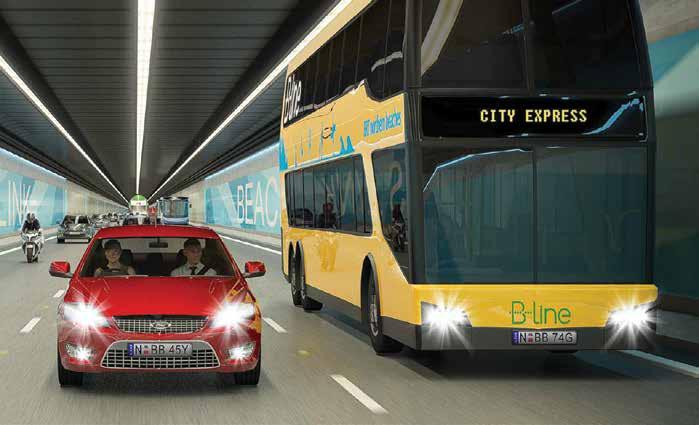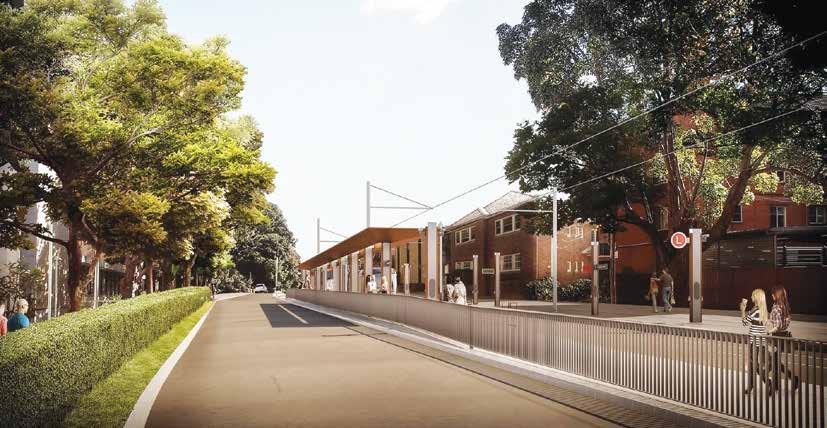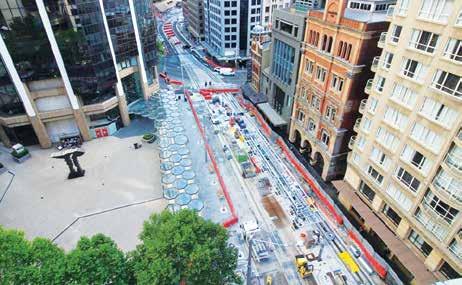
9 minute read
New South Wales
from REX Mar 2019
by Prime Group
Road project cornerstone of Abbott’s Warringah campaign
FORMER PRIME MINISTER Tony Abbott has pinned his re-election hopes in Warringah to the construction of a road tunnel, defying rising opposition in the seat focused on larger issues such as climate policy.
Tony Abbott is eager to focus voters’ attention on local issues ahead of the forthcoming federal election, telling ABC’s 7:30 Report transport should be the number one issue in the minds of Warringah residents.
“What I’ll be saying to people in the local election is there is really only one issue, and that is transport,” he told ABC. “That’s why it is absolutely critical to get the Northern Beaches tunnel built.” Abbott’s flagship election project would build a road tunnel under Middle Harbour, connecting to the Gore Hill Freeway and the Warringah Freeway, to bet ter link the Northern Beaches with North Sydney, the Sydney CBD, Chatswood, Macquarie Park and Sydney’s northwest.
Sydney’s Northern Beaches region does not have a connection to the city’s rail network. Abbott, who made road building a signature of his Government and believes urban rail projects are not the business of the Federal Government, believes the Beaches Link road project can become another lasting imprint of his leadership in Warringah.
“If you look around this electorate there are all sorts of monuments – if you like – to the work I have done as local member,” he told ABC. “I’ve never been complacent.”
Abbott’s primary challenger in his bid to win his tenth consecutive election in Warringah looks to be independent candidate Zali Stegall. Stegall, a barrister and former Olympic skier, says her campaign is focused on bigger issues than what the former prime mi nister is willing to focus on.
“I think I’m a whole new generation really,” Stegall told 7:30. “I think he is very set in his ways and I think he is really unable, unwilling to change … I don’t think he’s particularly interested in
listening to the electorate and their views and priorities. As I see it there’s a real dissatisfaction with the major parties by the Australian public – the politicians, the party politics, the behind-the-scenes deals, the hidden agendas. People are tired if and really don’t want a bar of it.”
Abbott has urged voters to look past Stegall’s bid to be the ‘anti-party disruptor’, saying she is essentially working for the Labor vote.
“In a seat like Warringah, independents are basically Labor candidates in disguise,” Abbott said. “Over the years I’ve had some quite serious challenges, and I don’t expect it’s going to be any different this year.” But ABC election analyst Antony Green says Stegall has a real chance to shake things up in Warringah. “She’s not some fly-by-night candidate,” Green said. “She has Liberal credentials, conservative credentials, and she may appeal to Liberal voters to drive the Liberal vote down under 50 per cent.” Though he conceded, “it’s still a big ask for her to win a seat like Warringah”.
Sydney Metro City & Southwest will include 31km of tunnels.
Musk’s ambitious $1bn quote for Blue Mountains tunnel

Tesla founder Elon Musk believes his Boring Company’s tunnel can be a real mass transit solution.
TECHNOLOGY ENTREPRENEUR ELON MUSK says his Boring Company transport loop system could deliver a 50-kilometre underground transit system beneath the Blue Mountains west of Sydney for roughly US$1 billion.
Asked by Independent NSW MP Jeremy Buckingham for a solution to connect Sydney to the western side of the Blue Mountains, Tesla founder Elon Musk tweeted his back-of-the-envelope costings for a tunnel Buckingham said would “open up the west of our state” and help a city which is “choking with traffic”.
“About $15M/km for a two way high speed transit, so probably around $750M plus maybe $50M/station,” Musk tweeted on January 16.
“Sounds like a bargain,” Buckingham said of Musk’s figures. “Could be a game changer to go under the Blue Mountains with a modern link between Sydney and the west. I’ll raise it with the Premier @GladysB, other colleagues, the community, and get back to you.”
Buckingham subsequently tweeted a
potential route for the tunnel, running from Penrith to just south of Lithgow.
The Boring Company, founded by Musk in 2016, recently debuted its 1.8-kilometre Boring Test Tunnel, featuring retractable wheels Musk says turn a car “into a railguided train and back again”. The test tunnel is capable of moving vehicles at roughly 120km/h, according to Musk’s statements to the media, but he has said he wants to see speeds of up to 250km/h, at a rate of 4,000 vehicles per hour.
“A variety of vehicles, like normal

roads, from a small car to a densely seated bus,” Musk detailed on December 20. “If all vehicles were densely seated buses, throughput in excess of 100,000 people per hour per lane is possible, but better to offer a range of vehicles and let people decide what makes them happy.”
Musk made headlines in 2017 when he offered to help solve South Australia’s energy woes by building a 100MW energy storage facility within 100 days, or it would be free. Tesla subsequently delivered the battery at a reported cost of $90 million. “ If all vehicles were densely seated buses, throughput in excess of 100,000 people per hour per lane is possible, but better to offer a range of vehicles ”
Caption right
The Boring Company’s tunnel is designed to turn a car into a rail-guided train and back again, Musk says.
Sydney Metro City & Southwest will include 31km of tunnels.

SYDNEY METRO Caption right

BEACON ENERGY SOLUTIONS HAVE PARTNERED WITH SONARAY We’ve joined forces to provide our clients with sustainable industry solutions including LED lighting upgrades, solar system design and installation and HVAC improvements. Call us today to discuss your energy requirements.
Sydney Light Rail: Report details lessons learned the hard way

A NSW Parliamentary committee has made 20 recommendations for future transport developments.
INADEQUATE NOISE MONITORING, the mental health of business owners, and the nature of PPP contracts are just some of the issues emphasised by a Parliamentary report into the procurement and delivery of light rail through the Sydney CBD.
Parliamentary committee chairman Fred Nile’s final report into the CBD and South East Light Rail project, released last week, makes 20 recommendations, many of them to ensure future projects do not repeat the mistakes identified over severalhearings in 2018. “With infrastructure projects of this magnitude, a degree of disruption is to be expected,” Nile says. “However, as this inquiry has shown, the impacts of construction have been profoundly experienced by residents and businesses located along the light rail route. Many have experienced excessive noise, dust, vibration and damage to their homes. Some
of these issues have been heightened due to construction delays.”
The report indicates residents have frequently been exposed to unacceptable noise levels outside of regular work hours. Nile says this “has been impinging particularly on residents’ lives,” and says “noise has not been adequately monitored”. “Although alternative accommodation has been offered as a mitigation measure to some residents, the committee understands that this has often been an impracticable option,” he adds. One recommendation is for Transport for NSW to consider whether the Independent Environmental Representative’s role needs to be expanded to include noise monitoring, or whether a separate authority should be appointed to manage this.
Another is for Transport to review its communication strategy, taking into account concerns raised, and report to the minister

for transport on any improvements that can be implemented for future projects. The report questions the effectiveness of the State’s communication not only with residents, but also small business owners. Business owners along the route have complained the disruption caused by light rail construction has savaged their goodwill and foot traffic – and thus their bottom line. While recommending the State extends and intensifies its remediation efforts, Nile’s report goes a step further, suggesting the mental health of small business owners has not been properly cared for throughout. “It was clear to the committee just how much businesses have struggled since the commencement of construction of the light rail, with some having closed down,” Nile reports. “Not only have they endured significant financial losses, their physical and “ It was clear to the committee just how much businesses have struggled since the commencement of construction of the light rail, with some having closed down ”
mental wellbeing has also been negatively impacted. This was particularly distressing for committee members to see, and we thank those who came forwardto share with us so honestly the affect this project has had on their personallives.” The report recommends the Transport and the Small Business Commissioner encourage and support businesses to apply for financial assistance, “even in circumstances where businesses may not meet eligibility criteria”. Another recommendation urges Transport to continue to provide financial assistance until the project is completed, and a pair of recommendations address what steps should be taken to ensure the mental health of business owners is supported – and how this support can be better communicated to those in need. Crucially, the report also addresses concerns over the effectiveness of Public Private Partnership contracts for significant state infrastructure projects, calling for a review by the Auditor-General at the request of the NSW Government.
“Serious questions have been raised Construction underway at Circular Quay.
in relation to the project’s timeframes and costs,” Nile writes. “It is already delayed by at least a year, and although Transport for NSW would like it to be finalised by December 2019, the official completion date is currently March 2020. There may also be a further two month delay, according to the evidence provided by ALTRAC andAcciona. “In terms of costs, unresolved claims




SYDNEY METRO Sydney Metro City & Southwest will include 31km of tunnels. for contract modifications, undetermined penalties for delays, and a complex legal dispute between Transport for NSW and Acciona, have raised questions about whether the project will exceed its $2.1 billion budget. This is understandable, given a liquidity facility fund has had to be established for ALTRAC and the department has had to provide $100 million to a contractor to keep the projectgoing.”









